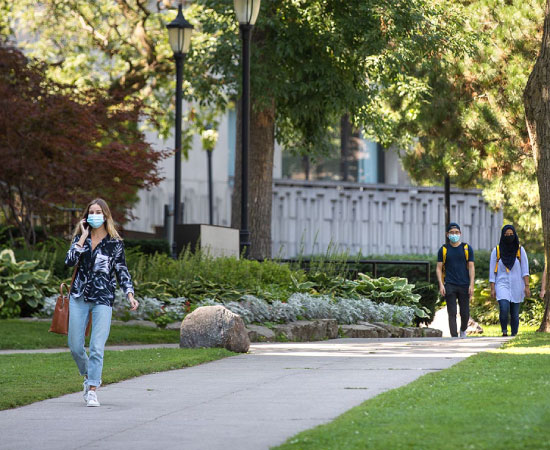Since the earliest days of the pandemic, A&S scholars, scientists and students from across disciplines have been contributing to the public discourse on the impact of COVID-19 — and many members of our community have been actively engaged in the fight against it.
Our A&S experts weighed in on some lessons learned shortly after the World Health Organization declared a global crisis, and studied the onslaught of data and statistics surrounding the spread of the virus that was announced daily with dizzying speed, while students explored how the virus spreads using a computer simulation.
Many students also did what they could to help others. Some provided food for seniors who became isolated in their homes, while others reached out to long-term care workers and residents with conversations and coffee to bring a smile to their days. Others still came up with ways to offer support locally and globally by drawing on their own academic expertise.
Meanwhile, many faculty members commented on myriad aspects of the pandemic in a wide range of media — from local to international in scope — on television and radio, in print and online.
Matti Siemiatycki, a professor in the Department of Geography & Planning and interim director of the School of Cities, was frequently called on to comment on the various ways in which the pandemic may change Toronto — and cities generally — in CTV News, CBC News, and Maclean’s.
The potential impact on the Canadian and global economies was also a frequent discussion topic. Rafael Gomez, associate professor and director of the Centre for Industrial Relations & Human Resources, participated in a panel on TVO’s The Agenda about the pandemic’s effects on small- and medium-sized businesses. Gomez also discussed the fate of restaurants specifically again on TVO’s The Agenda.
Department of Economics professor Michael Smart commented on the effectiveness of various measures introduced by the Government of Canada to support individual Canadians facing financial hardship. Smart discussed the Canada Recovery Benefit designed to support self-employed workers and those laid off by their employers in the Globe and Mail, shared his expertise on the management of Canada’s national debt in 2021 in Maclean’s, and the potential impact on inflation amid efforts to recover from the economic effects caused by the pandemic.
And with the onset of widespread quarantining, self-isolation and stay-at-home orders of various degrees, many people found themselves looking for ways to occupy their time. Professor Marcel Danesi in the Department of Anthropology commented on the growing interest among millennials in so-called ‘old-time’ hobbies such as stamp collecting and knitting, as well as new and renewed interest in jigsaw puzzles and board games in the Toronto Sun and toronto.com.
More stories written by A&S News:

- Spike in ageism during pandemic
When COVID-19 first emerged and began to spread, the rush to identify common characteristics shared by those infected included geographic location, lifestyle and pre-existing health conditions. It soon emerged that advanced age was likely a contributing factor in being vulnerable to the virus. - A&S political scientist shares how the social sciences can help us better understand the COVID-19 pandemic
During times of crisis like COVID-19, many are looking to the life sciences and medical fields for answers. But Faculty of Arts & Science political scientist Sylvia Bashevkin says the “social science toolkit” is just as important these days. - Tired of taking the same old walks during the pandemic? Try taking a walk through Indigenous history
In response to restrictions put in place during the COVID-19 pandemic, many people re-discovered simple pleasures like baking, gardening and taking walks. And many used various digital apps to turn their walks into guided cultural or historic tours. - Can the internet help people get through the pandemic? New book on personal, financial and emotional impacts of COVID-19
This e-book was written to give readers advice on easing the personal, financial and emotional impacts of the pandemic, focusing on the role of the internet and digital technologies. - New book explores transformative possibilities — theological and ecological — of pandemic
With contributions from international scholars of religion, science and philosophy, this book offers ecological and theological perspectives on how the pandemic is more than simply a problem to manage our way out of.
More faculty featured in the media:

- Enid Slack, director of the Institute on Municipal Finance and Governance at the Munk School of Global Affairs & Public Policy explained how the ability of governments at all levels to collect tax revenues will determine Canada’s economic recovery in the wake of the COVID-19 pandemic in Maclean’s.
- Munk School professor Drew Fagan and assistant professor Sean Speer spoke about post-pandemic economic recovery in the Financial Post. Fagan also spoke about opportunities for Canadian innovation during the pandemic in BetaKit.
- Department of Sociology professor and chair Scott Schieman advised on best practices for employees working from home in CTV News and the CBC.
- Professor Emerita Margaret MacMillan of the Department of History examined the states of societies around the world and their abilities to cope with the pandemic in a Globe and Mail op-ed.
- Lisa Strug, a professor in the Department of Statistical Sciences and the Department of Computer Science and director of the Ontario Regional Centre of the Canadian Statistical Sciences Institute (CANSSI), was featured in a Globe and Mail story about the varying ways COVID-19 affects people in different age groups. Strug was also quoted in a USA Today story about the role of genetics in the extent to which someone is affected by the virus.
- Lynette Ong, an associate professor in the Department of Political Science and the Asian Institute at the Munk School, spoke about various topics related to China and the pandemic including actions taken by the World Health Organization during the early days of the outbreak in CBC News, and Canada-China relations on TVO’s The Agenda.
- Mark Kingwell, a professor in the Department of Philosophy, wrote about renewed interest in Albert Camus’s 1947 novel The Plague and its relevance to the COVID-19 pandemic in a Globe and Mail op-ed. Kingwell also offered an assessment of people’s approaches to risk taking on CBC Radio’s Here and Now, and how the COVID-19 pandemic has affected the way some people make decisions.
- Frank Rudzicz, an associate professor in the Department of Computer Science, commented on the prospect of using artificial intelligence to diagnose a COVID-19 infection via someone’s voice in a Nature news feature.
- Department of Political Science professor Nelson Wiseman commented on the approval ratings of various Canadian premiers throughout the course of the COVID-19 pandemic in CityNews. Past research and analysis by Wiseman was also referenced in a Globe and Mail op-ed examining the impact of the unique history of Alberta on the COVID-19 pandemic and debates about cancelling Halloween.
- Eric Merkley, a postdoctoral fellow in the Department of Political Science, commented on calls for review of the Canadian government’s response to the COVID-19 pandemic in the National Post.
- Department of Psychology professor Alison Chasteen commented on the increase in ageism and age discrimination during the pandemic in the Winnipeg Free Press (paywall) and the Halifax Chronicle Herald.
- University Professor Janice Stein of the Department of Political Science and the Munk School suggested that the United States’s response to the COVID-19 pandemic is the most important thing for Canada following the presidential election in the New York Times.
- Christopher Parsons, a senior research associate in the Citizen Lab at the Munk School, commented in a Globe and Mail story about the minimal use of the contact tracing app developed by the Government of Alberta.
- Department of Political Science professor Ron Deibert, director of the Citizen Lab at the Munk School, wrote an op-ed in the Globe and Mail examining how the COVID-19 pandemic has made people more dependent on digital technology.
- Citizen Lab senior research fellow Bill Marczak commented on Zoom’s increased popularity during the COVID-19 pandemic in a CNN story.
- Alex Luscombe a PhD candidate at the Centre for Criminology & Sociolegal Studies shared his research questioning whether COVID-19 penalties deter behaviour in the National Post (paywall).
- Department of Political Science PhD candidate Aden Dur-e-Aden commented in a Global News story about the involvement of right-wing extremists in anti-mask demonstrations across Canada.
- Michael Smart commented in a CBC News story reporting on several Canadian corporations who have continued to record significant profits throughout the COVID-19 pandemic, while collecting payments from the Canadian Emergency Wage Subsidy program meant to protect the jobs of their employees.
- Department of Astronomy & Astrophysics assistant professor Hilding Neilson spoke about the growing interest in astronomy during the pandemic for CBC Radio’s The Current.

